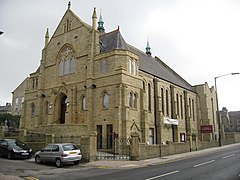Tottington, Greater Manchester
| Tottington | |
|---|---|
 Tottington Methodist Church |
|
| Tottington shown within Greater Manchester | |
| Population | 9,783 (2011 Census) |
| OS grid reference | SD775130 |
| • London | 173 miles away |
| Metropolitan borough | |
| Metropolitan county | |
| Region | |
| Country | England |
| Sovereign state | United Kingdom |
| Post town | BURY |
| Postcode district | BL8 |
| Dialling code | 01204 |
| Police | Greater Manchester |
| Fire | Greater Manchester |
| Ambulance | North West |
| EU Parliament | North West England |
| UK Parliament | |
Tottington is a small town between Bury and Ramsbottom on the edge of the West Pennine Moors. Since 1974 it has been part of the Metropolitan Borough of Bury, in Greater Manchester, England.
Historically in Lancashire, Tottington's early history is marked by its status as a medieval fee, a type of royal manor which encompassed several townships. It stretched from Musbury and Cowpe with Lench in the north to Affetside in the west and Walshaw in the south west, while the township of Tottington itself was a small agricultural settlement surrounded by open farmland and hunting ground where deer and wild boar were found.
There is no mention of Tottington in the Domesday Book and little evidence of a settlement before the Norman conquest. The earliest extant record of Tottington is from 1212 when it was recorded as Totinton. Tottington's name is most likely derived from the Old English for the land or farmstead belonging to a man called Tota; or "tot" may be from an Old English word meaning "hilltop lookout point".
Tottington was part of the larger Royal Manor of Tottington, which comprised the northern part of the parish of Bury and was originally part of the De Montbegon Barony (Roger de Montbegon was present at the signing of the Magna Carta). Throughout the Middle Ages the manor was reduced as land was exchanged and bequeathed. Walmersley and Shuttleworth were given to the Lord of Bury; Musbury and Cowpe with Lench in the north were ceded to Blackburnshire. The Manor of Tottington eventually formed part of the Honour of Clitheroe, which in turn became part of the eventual Duchy of Lancaster. When the Duke of Lancaster seized the throne to become Henry IV the duchy became royal and the Manor of Tottington with it.
...
Wikipedia

